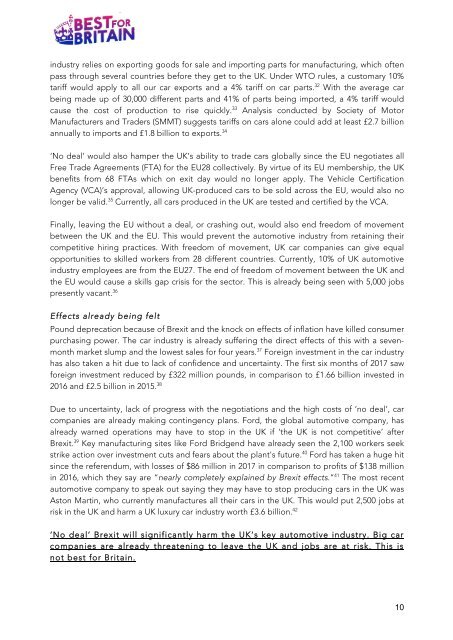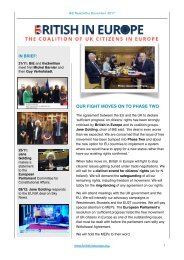Best for Britain Brexit-Reports-6.12.17-FINAL
Create successful ePaper yourself
Turn your PDF publications into a flip-book with our unique Google optimized e-Paper software.
industry relies on exporting goods <strong>for</strong> sale and importing parts <strong>for</strong> manufacturing, which often<br />
pass through several countries be<strong>for</strong>e they get to the UK. Under WTO rules, a customary 10%<br />
tariff would apply to all our car exports and a 4% tariff on car parts. 32 With the average car<br />
being made up of 30,000 different parts and 41% of parts being imported, a 4% tariff would<br />
cause the cost of production to rise quickly. 33 Analysis conducted by Society of Motor<br />
Manufacturers and Traders (SMMT) suggests tariffs on cars alone could add at least £2.7 billion<br />
annually to imports and £1.8 billion to exports. 34<br />
‘No deal’ would also hamper the UK’s ability to trade cars globally since the EU negotiates all<br />
Free Trade Agreements (FTA) <strong>for</strong> the EU28 collectively. By virtue of its EU membership, the UK<br />
benefits from 68 FTAs which on exit day would no longer apply. The Vehicle Certification<br />
Agency (VCA)’s approval, allowing UK-produced cars to be sold across the EU, would also no<br />
longer be valid. 35 Currently, all cars produced in the UK are tested and certified by the VCA.<br />
Finally, leaving the EU without a deal, or crashing out, would also end freedom of movement<br />
between the UK and the EU. This would prevent the automotive industry from retaining their<br />
competitive hiring practices. With freedom of movement, UK car companies can give equal<br />
opportunities to skilled workers from 28 different countries. Currently, 10% of UK automotive<br />
industry employees are from the EU27. The end of freedom of movement between the UK and<br />
the EU would cause a skills gap crisis <strong>for</strong> the sector. This is already being seen with 5,000 jobs<br />
presently vacant. 36<br />
Effects already being felt<br />
Pound deprecation because of <strong>Brexit</strong> and the knock on effects of inflation have killed consumer<br />
purchasing power. The car industry is already suffering the direct effects of this with a sevenmonth<br />
market slump and the lowest sales <strong>for</strong> four years. 37 Foreign investment in the car industry<br />
has also taken a hit due to lack of confidence and uncertainty. The first six months of 2017 saw<br />
<strong>for</strong>eign investment reduced by £322 million pounds, in comparison to £1.66 billion invested in<br />
2016 and £2.5 billion in 2015. 38<br />
Due to uncertainty, lack of progress with the negotiations and the high costs of ‘no deal’, car<br />
companies are already making contingency plans. Ford, the global automotive company, has<br />
already warned operations may have to stop in the UK if ‘the UK is not competitive’ after<br />
<strong>Brexit</strong>. 39 Key manufacturing sites like Ford Bridgend have already seen the 2,100 workers seek<br />
strike action over investment cuts and fears about the plant's future. 40 Ford has taken a huge hit<br />
since the referendum, with losses of $86 million in 2017 in comparison to profits of $138 million<br />
in 2016, which they say are “nearly completely explained by <strong>Brexit</strong> effects.” 41 The most recent<br />
automotive company to speak out saying they may have to stop producing cars in the UK was<br />
Aston Martin, who currently manufactures all their cars in the UK. This would put 2,500 jobs at<br />
risk in the UK and harm a UK luxury car industry worth £3.6 billion. 42<br />
‘No deal’ <strong>Brexit</strong> will significantly harm the UK’s key automotive industry. Big car<br />
companies are already threatening to leave the UK and jobs are at risk. This is<br />
not best <strong>for</strong> <strong>Britain</strong>.<br />
10
















